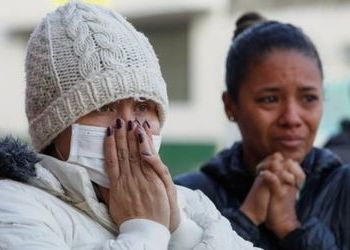Fears of contagion amid the coronavirus pandemic have spurred deadly riots, mass breakouts, and crackdowns in several Latin American prisons, exposing how long-term issues of overcrowding and deteriorating conditions can quickly turn to mayhem during a crisis.
On March 21, riots broke out at 13 prisons across Colombia, reported El Tiempo. The La Modelo prison in Bogotá saw the worst of the violence, with 23 inmates killed, 83 injured, and seven guards wounded amid a massive riot, said Justice Minister Margarita Cabello Blanco in a public broadcast.
While the government said the violence was sparked by a mass escape attempt, prisoners claimed that the uprising was caused by “insufficient measures” to contain the spread of the coronavirus, according to El Tiempo.
Cárcel la modelo. @C1Palomino @INPEC_Colombia pic.twitter.com/hCj2triBDg
— María Camila Díaz Roa (@ma_camiladiaz) March 22, 2020
On March 16, violence broke out at four prisons in Brazil’s state of São Paulo after authorities canceled temporary leave for low-risk prisoners out of fear they could return infected. Some 34,000 inmates in semi-open regimes had their temporary release cancelled “to safeguard the collective health of the prison population,” penitentiary officials said in a news release.
Rebelião na penitenciária de Mongaguá, litoral de SP. Até o momento, 8 agentes estão sendo feitos de refém. Presos fugiram pela orla da praia sentido Praia Grande. PM em atuação no local. pic.twitter.com/26JVlAg2IJ
— Leonardo Martins (@___leomartins) March 16, 2020
Videos posted on social media appeared to show dozens of prisoners running down a street near the prison of Mongaguá, with a man overheard yelling at the inmates to “come back Monday.”
By the time authorities suppressed riots at the prisons of Tremembé, Mongaguá and Porto Feliz, at least 1,375 inmates had escaped. On March 19, some 700 prisoners had been recaptured, according to the regional government, but hundreds more were still at large.
SEE ALSO: Coverage of Prisons
In Venezuela, more than 80 inmates escaped during a violent jailbreak March 18 at a prison in the town of Santa Bárbara in northwest Venezuela. Clashes between authorities and prisoners left ten prisoners dead, state authorities told CNN. Una Ventana a la Libertad (A Window to Liberty), a human rights organization in Venezuela, later updated the body count to 12.
The escape attempt came amid new restrictions on prison life taken due to the coronavirus outbreak in the country, El Comercio reported, citing the governor of Zulia, Omar Prieto.
InSight Crime Analysis
Prisons in the region are ideal incubators for the spread of the coronavirus, leading to prisoners anxious over outbreaks while governments further restrict their movements — a perfect storm in the making.
Visits have been suspended in Paraguay, in Brazil, Colombia, Peru and Honduras. In Chile, El Salvador and Uruguay, prisoners have also faced new restrictions.
But it is uncertain whether these measures will have the desired impact. New infections are rising across the region, and given how porous prison security is in countries like Brazil and Paraguay, it seems only a matter of time before prisoners are infected en masse.
SEE ALSO: Coverage of Prisons
What’s more, the deep-seated problems in Latin America’s prisons — overcrowding, lack of security personnel, and unsanitary conditions — have only been exacerbated by the threat of the coronavirus.
In its recent 2019 human rights report, the US State Department quoted Venezuelan organizations that said that overcrowding was at 172 percent and 415 percent in police jails, with spikes of up to 1,200 percent.
Such conditions have already led to outbreaks of other diseases, including a tuberculosis outbreak in 2020 that killed at least 11 inmates in one Venezuelan prison, according to a report by A Window to Liberty.
The potential for an outbreak also means governments will have to make decisions about whether they can safely house prisoners. On March 22, Colombia announced it would release around 10,000 at-risk prisoners to go into house arrest for three months, including those over 60, new mothers and pregnant women, and the seriously ill.
In Brazil, a legal association is asking that preventive detention be suspended and that their clients be temporarily freed or placed under house arrest to avoid potential infection.
The legal association filed a petition with Brazil’s supreme court to release prisoners over 60, and also those with HIV, cancer, tuberculosis or history of lung and heart disease, among others.
Countries around the world are facing similar tensions in prisons. In early March, a suspension of prison visits in Italy led to rioting at 27 facilities, with several escaping and six inmates dying after they broke into a prison pharmacy and overdosed on methadone.
The United States is also bracing for unrest among inmates ahead of a potential national lockdown due to the coronavirus.
While deteriorating conditions plaguing Latin America’s prisons have long been recorded, the string of violent riots underscores that the threat of a coronavirus outbreak — along with inmates fear of the virus — can plunge the penitentiary system into chaos.

